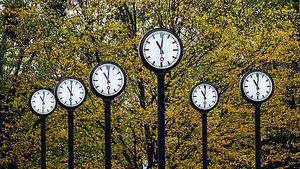What's the history of the changing of the clocks?

Ottoline Spearman
The Irish Museum of Time in Waterford is preparing to change the time on almost 600 clocks this weekend.
The time will go back one hour on Sunday, marking the end of Daylight Saving Time (DST).
This means one extra hour in bed, and a change back to Greenwich Mean Time (GMT).
But what is the history behind the clocks changing?
When do the clocks change?
The clocks will go back at 2am on Sunday, October 26th, 2025. This means that clocks are turned backwards one hour to 1am - meaning an extra hour in bed. However, it also means one less hour of sunlight in the afternoons and evenings.
The clocks go back every year on the last Sunday in October, and they go forward on the last Sunday in March.
An easy way of remembering which way they change - and to adopt an Americanism - is "spring forward, fall back".
History of the clocks changing
The idea of changing the clock harks back to the 18th century. In 1784, founding father of the United States, Benjamin Franklin, made a tongue-in-cheek comment to the Journal de Paris, as reported by RTÉ, suggesting it as a way of saving money on candles.
The concept of DST was then popularised by English building contractor William Willett, who just happens to be the great-great-grandfather of Coldplay singer Chris Martin. Mr Willet was motivated primarily by a desire to provide more daylight time for leisure activities for workers.

According to RTÉ, among proponents was UK Prime Minister Winston Churchill; with The Irish Times a staunch opponent, who referred to DST - perhaps in an exaggerated manner - as "barbaric".
After several failed bills, and despite the death of William Willett in 1915, DST was introduced to Great Britain and Ireland in 1916 with the Daylight Saving Act 1916. According to RTÉ, this dominated the news cycle a surprising amount, despite other major moments in history around that time, including the East Rising and World War One.
Ben Shorten wrote for RTÉ that "One correspondent to the Irish Times warned those with court dates scheduled of the importance of keeping to the new time: ‘…a sleepy plaintiff or complainant who arrives an hour after his case has been dismissed with costs may get a shock, while a defendant may be dumbfoundered [sic] to find an escort ready to march him off to undergo a month’s hard labour for an offence to which he may have had a perfect answer.’"
In 2019, the European Parliament voted in favour of removing daylight saving time permanently after spring 2021. This followed research from the European Commission, which saw 4.6million responding to a public consultation.
Despite this, EU institutions have failed to make any progress in implementing the decision, not least due to the Covid-19 pandemic, so we will still be changing the clocks until the changes take effect.
Should the clocks still be changed?
There has been a vociferous debate over the years as to whether we should still keep changing the clocks.
DST can have numerous benefits, including fewer accidents and less crime, as well as increased productivity.
Dr Jeffrey Kelu, circadian rhythms expert at King’s College London, told PA news agency: “I think there are some suggestions that there is less crime because more people are out there in the evening and it is harder to commit crimes.
“Also there are fewer traffic accidents because there is more light and people can see the traffic conditions more clearly. But there are conflicting studies.”
Arguments to scrap DST tend to revolve around affecting people's circadian rhythm, and mental health.
One such proponent is Ireland South MEP Cynthia Ní Mhurchú. Speaking on Newstalk, she said: "[Scrapping the change] would improve mental health and well-being. It would save on energy bills. It would benefit road safety, not just for drivers, but pedestrians too. It would benefit trading between our countries."
Where in the world has daylight saving time?
DST is observed in over 70 countries worldwide - in most parts of Europe, North America and Canada, and the Southern Hemisphere. European countries that do not follow it include Iceland, Russia, and Belarus.




